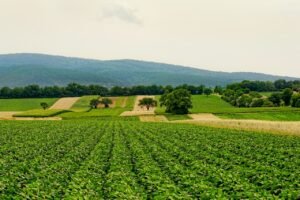
Are you curious about the numerous advantages of organic farming? Look no further! In this article, you will discover the multitude of benefits that arise from embracing organic farming practices. From promoting healthy soil and biodiversity to reducing the use of harmful chemicals, organic farming is not only good for the environment but also for our health. By choosing organic, you are not just supporting sustainable agriculture, but also ensuring that you and your loved ones consume food that is free from synthetic pesticides and genetically modified organisms (GMOs). Delve into the world of organic farming and unlock a wealth of goodness for both you and the planet.
What is Organic Farming?
Definition
Organic farming is a method of agricultural production that focuses on cultivating crops and rearing livestock in harmony with nature, without the use of synthetic fertilizers, pesticides, genetically modified organisms (GMOs), or growth hormones. It is a holistic approach that aims to minimize negative impacts on the environment while producing high-quality, sustainable food.
Principles
The principles of organic farming revolve around the idea of nourishing the soil, promoting biodiversity, and respecting the natural cycles of ecosystems. Organic farmers prioritize the use of organic matter, crop rotations, and biological pest control methods to maintain soil fertility and prevent the buildup of harmful substances. They also emphasize the importance of animal welfare and the preservation of natural resources.
Environmental Benefits of Organic Farming
Soil Conservation
One of the key environmental benefits of organic farming is its focus on soil conservation. Through practices such as crop rotation, cover cropping, and the use of organic fertilizers like compost and manure, organic farmers promote the health and fertility of the soil. This not only improves the quality of the crops but also prevents soil erosion, enhances water holding capacity, and reduces the risk of nutrient runoff.
Reduced Pollution
By eliminating the use of synthetic fertilizers and pesticides, organic farming significantly reduces the pollution of soil, water, and air. Synthetic chemicals used in conventional farming can contaminate water bodies and harm aquatic life, while their release into the atmosphere contributes to air pollution and global warming. Organic farming, on the other hand, relies on natural methods to control pests and diseases, minimizing the adverse effects on the environment.
Water Conservation
Organic farming emphasizes water conservation through practices such as mulching and efficient irrigation techniques. Mulching helps retain soil moisture, reducing the need for excessive watering. Additionally, organically managed soils have better water infiltration rates, allowing for improved water retention and reducing the risk of water scarcity. By conserving water resources, organic farming contributes to sustainable water management and mitigates the effects of droughts.
Health Benefits of Organic Farming
Nutrient-rich Foods
Organic farming practices promote the production of nutrient-rich foods. Research has shown that organically grown fruits and vegetables often contain higher levels of vitamins, minerals, and antioxidants compared to their conventionally grown counterparts. This is attributed to the use of organic fertilizers and the absence of synthetic chemicals, which help enhance the nutritional value of the crops. By consuming organic foods, you can ensure that you are nourishing your body with wholesome and healthy nutrients.
No Harmful Chemicals
Conventional farming relies heavily on the use of synthetic pesticides and herbicides to control pests and weeds. However, these chemicals can have negative health effects when consumed in large quantities. Organic farming eliminates the use of such harmful chemicals, making organic produce a safer option for consumption. By choosing organic foods, you can minimize your exposure to potentially harmful substances and support your overall well-being.
Economic Benefits of Organic Farming
Reduced Input Costs
While the transition to organic farming may require initial investments, organic farmers can often benefit from reduced input costs in the long run. Without the need for synthetic fertilizers and pesticides, organic farmers can save money on purchasing costly inputs. Organic practices also tend to require fewer inputs, as organic fertilizers like compost can be produced on-farm, reducing dependence on external suppliers. By minimizing input costs, organic farmers can improve their economic viability and profitability.
Higher Market Prices
Organic produce often commands higher market prices due to increased consumer demand and the perceived value of organic foods. With growing awareness and preference for organic products, farmers who embrace organic farming methods can tap into a niche market and receive a premium for their produce. This price premium can offset the increased costs associated with organic farming practices, offering farmers a competitive edge and financial incentives to transition to organic agriculture.
Community Benefits of Organic Farming
Job Creation
Organic farming can contribute to job creation and local economic development. Since organic farming often requires more labor-intensive practices like manual weed control and diversified cropping systems, it can generate employment opportunities in rural communities. Small-scale organic farms can serve as a source of livelihood for local farmers, providing a sustainable income and helping stimulate the local economy. By supporting organic farming, you can play a part in creating jobs and supporting local communities.
Preserving Biodiversity
Organic farming practices promote the preservation and enhancement of biodiversity. By avoiding the use of synthetic chemicals, organic farmers create a more favorable environment for beneficial insects, birds, and other wildlife. Organic farms often have more diverse habitats and provide refuge for endangered or threatened species. Additionally, organic farming encourages the conservation of traditional seed varieties and supports agrobiodiversity. By supporting organic agriculture, you contribute to the protection of nature’s intricate web of life.
Organic Farming Techniques
Crop Rotation
Crop rotation is a fundamental technique in organic farming that involves systematically changing the crops planted in a specific area over time. This practice helps break disease cycles, control pests, and optimize soil fertility. By alternating between different crops, organic farmers can disrupt the life cycles of pests and diseases, reducing the need for chemical interventions. Crop rotation also helps replenish soil nutrients, as different crops have varying nutrient requirements and contributions to the soil.
Composting
Composting is the process of decomposing organic materials to create nutrient-rich compost, also known as “black gold.” Organic farmers utilize compost as a natural fertilizer to enhance soil health and fertility. Compost not only provides essential nutrients to the plants but also improves soil structure, increases water-holding capacity, and encourages beneficial microbial activity. Composting is a sustainable and cost-effective practice that allows organic farmers to close the nutrient loop by recycling organic waste.
Mulching
Mulching involves covering the soil surface with a layer of organic material, such as straw, leaves, or wood chips. This practice offers numerous benefits in organic farming. Mulch acts as a natural weed suppressant, reducing the need for herbicides and minimizing competition for resources between crops and weeds. It also helps conserve soil moisture by minimizing evaporation and regulating soil temperature. Additionally, mulch improves soil structure, prevents erosion, and promotes the activity of beneficial organisms in the soil.
Challenges in Organic Farming
Pests and Diseases Control
One of the major challenges in organic farming is the management of pests and diseases without the use of synthetic chemicals. Organic farmers employ various strategies, including crop rotation, companion planting, physical barriers, and the use of biological control agents, to control pests naturally. However, these methods may require more time, effort, and expertise to implement effectively. Continuous monitoring, timely interventions, and knowledge-based decision-making are essential for managing pests and diseases in organic farming.
Limited Availability of Organic Seeds
Another challenge faced by organic farmers is the limited availability of organic seeds. While the demand for organic produce has grown significantly, the production and availability of organic seeds have not kept pace. Organic farmers often rely on a limited range of certified organic seeds, which can restrict their ability to diversify crops or find suitable varieties for specific growing conditions. Expanding the availability and accessibility of organic seeds is crucial for the further development of organic farming.
Organic Certification
Requirements
Organic certification ensures that the products labeled as organic meet specific standards and have been produced using approved organic farming practices. The requirements for organic certification may vary among countries and certifying bodies, but they generally include the use of organic inputs, adherence to organic farming principles, documentation of farming practices, and regular inspections. Organic farmers must maintain detailed records of their activities and undergo annual inspections to maintain their certification status.
Certifying Bodies
Organic certification is usually carried out by independent organizations known as certifying bodies. These organizations assess and verify that farmers meet the necessary organic farming standards and requirements. Certifying bodies often have their own specific certification seals or logos, which are displayed on organic products to provide assurance to consumers. The involvement of certifying bodies ensures the integrity and credibility of organic certification processes, helping consumers make informed choices and fostering trust in organic farming practices.
Organic Farming Regulations
National Standards
Different countries have established their own national organic farming standards and regulations to govern organic production and labeling. These standards define the criteria and requirements that must be met for agricultural products to be labeled as organic. National standards typically cover aspects such as organic farming practices, input usage, labeling requirements, organic certification, and the oversight of certification bodies. Compliance with national organic standards is essential for farmers and businesses to legally sell organic products in their respective countries.
International Guidelines
In addition to national standards, there are also international guidelines and frameworks that provide guidance on organic farming practices. One such example is the Codex Alimentarius, a collection of internationally recognized standards, codes of practice, and guidelines related to food safety and quality. The International Federation of Organic Agriculture Movements (IFOAM) also sets forth principles, norms, and guidelines for organic agriculture on a global scale. These international guidelines help harmonize organic farming practices and facilitate global trade in organic products.
Future of Organic Farming
Increasing Demand
There is a growing demand for organic products worldwide, driven by increasing consumer awareness of health, environmental, and ethical concerns. As more people prioritize nutritious and sustainably produced food, the demand for organic farming is expected to continue growing. This presents opportunities for organic farmers to expand their operations, diversify their crops, and meet the evolving needs of conscious consumers. The future of organic farming looks promising, as it aligns with the preferences and values of a growing segment of the population.
Technological Advancements
Technological advancements play a vital role in the future of organic farming. Research and innovation are essential for improving organic farming practices, addressing challenges, and maximizing efficiency. Advancements in precision agriculture, remote sensing, and data analytics can help enhance decision-making processes, optimize resource use, and monitor crop health. Furthermore, the development of organic-friendly alternatives, such as biopesticides and biofertilizers, can provide effective and sustainable solutions for pest and disease control. Embracing technological advancements will enable organic farmers to increase productivity, reduce environmental impact, and contribute to the ongoing evolution of organic farming.
In conclusion, organic farming offers numerous benefits that span environmental, health, economic, and community dimensions. By adopting organic farming practices, farmers can promote soil conservation, reduce pollution, and conserve water resources. Organic farming also produces nutrient-rich foods without the use of harmful chemicals, supporting better health and well-being. From an economic standpoint, organic farming offers reduced input costs and the potential for higher market prices, contributing to the economic sustainability of farmers. Additionally, organic agriculture creates jobs and preserves biodiversity, fostering vibrant and resilient communities. Overcoming challenges, adhering to organic certification requirements, and complying with national and international regulations are crucial for ensuring the integrity and credibility of organic farming practices. As consumer demand for organic products continues to rise, the future of organic farming looks promising, with technological advancements playing a vital role in driving innovation and efficiency. Embracing organic farming is a positive step towards a more sustainable and regenerative agricultural system that benefits both the planet and its inhabitants.







